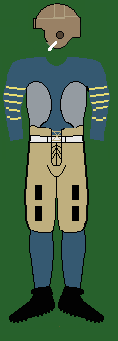1918 Michigan Wolverines football team
Michigan at Chicago
|
1 |
2 |
3 |
4 |
Total |
| • Wolverines
|
7 |
0 |
0 |
6 |
13 |
| Maroons |
0 |
0 |
0 |
0 |
0 |
|
Syracuse at Michigan
|
1 |
2 |
3 |
4 |
Total |
| Orange |
0 |
0 |
0 |
0 |
0 |
| • Wolverines
|
0 |
6 |
0 |
9 |
15 |
|
M.A.C. at Michigan
|
1 |
2 |
3 |
4 |
Total |
| Aggies |
0 |
0 |
0 |
6 |
6 |
| • Wolverines
|
0 |
14 |
7 |
0 |
21 |
|
Michigan at Ohio State
|
1 |
2 |
3 |
4 |
Total |
| • Wolverines
|
0 |
0 |
0 |
14 |
14 |
| Buckeyes |
0 |
0 |
0 |
0 |
0 |
|
The 1918 Michigan Wolverines football team represented the University of Michigan in the 1918 Big Ten Conference football season. The team's head football coach was Fielding H. Yost in his 18th season with the program. The 1918 team played in a season shortened by World War I travel restrictions and the 1918 flu pandemic. They shared the Big Ten Conference championship with Illinois and finished with a perfect record of 5–0, outscoring opponents 96 to 6. Although no formal mechanism existed in 1918 to select a national champion, the 1918 Michigan team was retroactively selected as the national champion by the Billingsley Report and a co-national champion with Pittsburgh by the National Championship Foundation. The Wolverines played their home games at Ferry Field.
Fullback Frank Steketee was selected by Walter Camp as a first-team All-American and was one of the top kickers in the game during the 1918 season. Center Ernie Vick, and left tackle Angus Goetz were both selected as first-team All-Big Ten players.
In 1918, the United States was embroiled in World War I. Many University of Michigan students, including athletes, were serving in the military. Team captain Elton Wieman did not play during the 1918 season as he had enlisted in the Aviation Corps. Halfback Eddie Usher was also taken into active military service after the first game of the season.
...
Wikipedia


